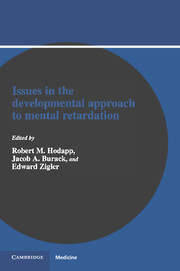Book contents
- Frontmatter
- Contents
- Preface
- Contributors
- Part 1 Developmental theory
- 1 The developmental perspective in the field of mental retardation
- 2 Differentiating mental retardation: The two-group approach and beyond
- 3 One road or many? Issues in the similar-sequence hypothesis
- 4 The similar-structure hypothesis and differential rate of development in mental retardation
- 5 Neo-environmental perspectives on developmental theory
- 6 The role of motivational factors in the functioning of mentally retarded individuals
- Part 2 Applying developmental theory to different types of retarded individuals
- Author index
- Subject index
6 - The role of motivational factors in the functioning of mentally retarded individuals
from Part 1 - Developmental theory
Published online by Cambridge University Press: 07 September 2010
- Frontmatter
- Contents
- Preface
- Contributors
- Part 1 Developmental theory
- 1 The developmental perspective in the field of mental retardation
- 2 Differentiating mental retardation: The two-group approach and beyond
- 3 One road or many? Issues in the similar-sequence hypothesis
- 4 The similar-structure hypothesis and differential rate of development in mental retardation
- 5 Neo-environmental perspectives on developmental theory
- 6 The role of motivational factors in the functioning of mentally retarded individuals
- Part 2 Applying developmental theory to different types of retarded individuals
- Author index
- Subject index
Summary
Investigators have long noted that personality factors are as important in the performance and adjustment of retarded individuals as cognitive factors (Penrose, 1963; Sarason, 1953; Tizard, 1953; Windle, 1962; Zigler, 1966b). Earlier workers, such as Potter (1922) and Fernald (1919), maintained that the difference between social adequacy and inadequacy in borderline retarded persons was a matter of personality rather than intelligence. Perhaps the first empirical study of this view was conducted by Weaver (1946), who examined the adjustment of 8,000 retarded persons inducted into the United States Army during World War II. Most of these recruits had IQs below 75, yet 54% of the males and 62% of the females made a satisfactory adjustment to military life. The median IQs of the successful and unsuccessful groups were 72 and 68, respectively. Weaver concluded that “personality factors far overshadowed the factor of intelligence” (p. 243) in the adjustment of retarded adults in the military.
At about the same time, a practical example of how intelligence is not the sole determinant of one's ability to function in society was provided by Harrell and Harrell (1945), who reported the IQ ranges for a variety of occupations. Persons involved in mining, trucking, farming, auto mechanics, bartending, sales, and tool making displayed a wide range of IQ scores. Although many of these persons had IQs in the average and above-average range, some individual miners, truckers, bartenders, and so on had IQs well below 70.
- Type
- Chapter
- Information
- Issues in the Developmental Approach to Mental Retardation , pp. 114 - 134Publisher: Cambridge University PressPrint publication year: 1990
- 13
- Cited by



